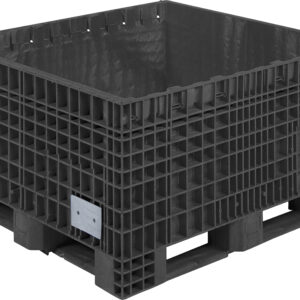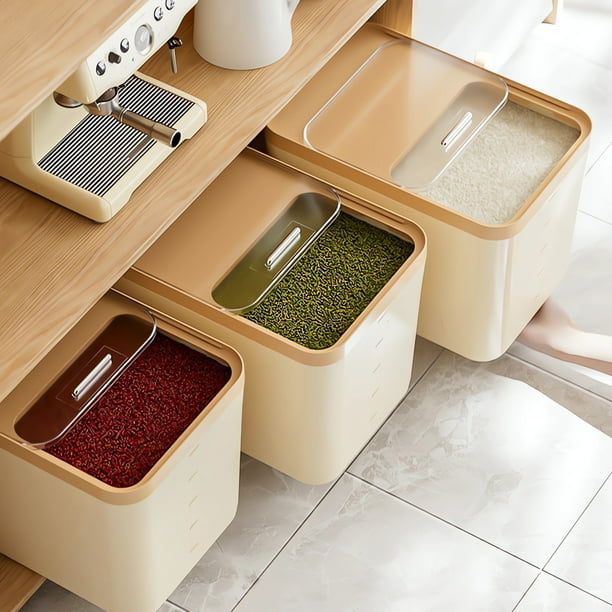Explore the top options of bulk plastic containers for sale online
Wiki Article
Everything About Bulk Plastic Containers: Advantages, Applications, and Market Insights
Mass plastic containers play a substantial role in various sectors, supplying benefits that improve performance and sustainability. Their lightweight nature lowers shipping costs, while their longevity warranties secure storage space and transportation of varied items. As firms progressively look for eco-friendly services, the need for these containers is growing. This raises essential inquiries about the materials used and the fads influencing their design. What effects do these factors have for the future of mass plastic containers?Benefits of Mass Plastic Containers
Mass plastic containers use a plethora of advantages in various sectors. Their lightweight design significantly minimizes transport costs, enabling efficient logistics and much easier handling. Furthermore, these containers supply sturdiness and resistance to weather aspects, chemicals, and physical effect, making certain the secure storage and transport of items. The adaptability of mass plastic containers permits them to be formed into numerous sizes and shapes, providing to certain sector needs.
Usual Applications Across Industries
While different sectors use bulk plastic containers, their applications are specifically famous in sectors such as food and drink, pharmaceuticals, agriculture, and manufacturing. In the food and beverage market, these containers are important for keeping and delivering products like grains, liquids, and prepared dishes, making certain quality and safety and security. The pharmaceutical field relies upon mass plastic containers for protected storage of medicines and injections, maintaining conformity with stringent guidelines.In agriculture, these containers promote efficient handling and transportation of produce, plant foods, and chemicals, while additionally sustaining lasting techniques through recyclability. Production markets utilize bulk plastic containers for components storage and assembly line operations, advertising organization and operations performance. Additionally, these containers offer a significant function in logistics and supply chain management, simplifying the activity of items across different industries. Generally, the versatility of mass plastic containers makes them essential across multiple markets.
Material and Layout Considerations
When picking mass plastic containers, material and design considerations play a vital duty in making certain capability and compliance with industry requirements. The choice of material greatly affects the container's durability, weight ability, and resistance to environmental factors. Usual materials consist of high-density polyethylene (HDPE) and polypropylene, recognized for their stamina and chemical resistance.Style aspects, such as closure, dimension, and form devices, also influence usability. Containers with ergonomic manages and stackable styles improve storage efficiency and simplicity of transport. Additionally, functions like venting or water drainage holes may be needed for specific applications, enabling for air flow or fluid removal.
Conformity with safety and security regulations, such as FDA authorizations for food-grade applications, is important. plastic bulk containers. In general, cautious factor to consider of materials and design can optimize performance and longevity, guaranteeing that mass plastic containers fulfill the diverse demands of numerous markets successfully
Fads in Bulk Plastic Container Usage
As sectors progress, the use of mass plastic containers is progressively affected by sustainability and performance. Firms are selecting environment-friendly materials, such as recycled plastics, to minimize ecological effect while preserving durability. This shift is driven by customer demand for lasting practices and regulatory stress aimed at minimizing plastic waste.In addition, the fad towards automation in logistics and supply chain monitoring is improving container styles. Bulk containers are now being crafted for compatibility with automated systems, boosting imp source operational performance. Lightweight layouts are additionally gaining traction, as they minimize delivery costs and energy intake throughout transportation.
Furthermore, personalization is becoming a centerpiece, enabling companies to customize containers to details requirements, consequently optimizing room and functionality. These trends mirror a broader commitment to sustainability, innovation, and effectiveness within various markets, ensuring that bulk plastic containers proceed to play a vital function in modern-day supply chains.
Best Practices for Storage and Transport
Reliable storage and transportation of mass plastic containers require adherence to best practices that boost safety and this post performance. Containers need to be piled securely, guaranteeing that weight is equally distributed to avoid tipping or damage. Using pallets can promote much easier motion and secure the containers from ground moisture. In addition, proper labeling is vital for quick identification and monitoring throughout transit.Temperature level control is another critical variable; extremes can compromise the integrity of the materials. When essential, it is advisable to store containers in a climate-controlled environment. For transportation, choosing appropriate vehicles made for bulk tons warranties stability and reduces risk during transit.
Normal evaluations of containers prior to storage space and transport assistance identify any wear or damage, permitting timely upkeep or substitute. By following these ideal methods, organizations can enhance the lifecycle of mass plastic containers straight from the source while preserving functional performance.
Regularly Asked Concerns

Are Bulk Plastic Containers Recyclable After Use?
Yes, bulk plastic containers are typically recyclable after use. Recyclability depends on the material type and neighborhood recycling programs. Proper cleansing and sorting are important to assure they are approved by reusing centers.
What Is the Life-span of Bulk Plastic Containers?
The life expectancy of bulk plastic containers normally varies from five to 10 years, depending upon usage problems, worldly quality, and ecological variables. Bulk Plastic Containers. Correct maintenance can extend their toughness, making them a long-lasting storage option
Can Mass Plastic Containers Be Customized?
Yes, bulk plastic containers can be tailored. Suppliers typically use options for dimension, product, branding, and shade, allowing businesses to tailor containers to their details demands and enhance their product presentation and performance.Exactly How Do Bulk Plastic Containers Contrast in Cost to Alternatives?
Mass plastic containers typically supply a reduced expense compared to choices like steel or glass, due to their lightweight nature and durability. This makes them an economical choice for companies needing effective storage space options.Are There Safety Rules for Using Mass Plastic Containers?

Bulk plastic containers play a considerable role in different industries, supplying benefits that boost efficiency and sustainability. While different industries utilize bulk plastic containers, their applications are specifically noticeable in markets such as food and beverage, pharmaceuticals, farming, and production. Production sectors use bulk plastic containers for components storage space and assembly line procedures, promoting company and workflow efficiency. When picking bulk plastic containers, material and design factors to consider play a crucial function in making certain functionality and conformity with industry standards. As industries develop, the usage of mass plastic containers is increasingly affected by sustainability and efficiency.
Report this wiki page